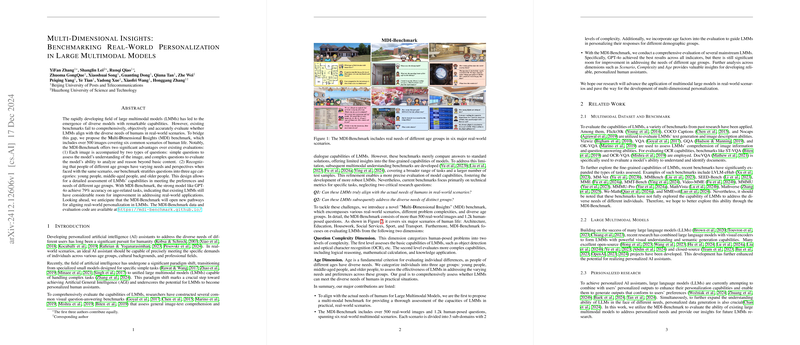Analyzing the Multi-Dimensional Insights Benchmark for Large Multimodal Models
The research paper "Multi-Dimensional Insights: Benchmarking Real-World Personalization in Large Multimodal Models" presents an important development in the evaluation of large multimodal models (LMMs). Traditional benchmarks insufficiently evaluate LMMs' capabilities to address the diverse and personalized needs of individuals across real-world scenarios. This paper introduces the Multi-Dimensional Insights (MDI) Benchmark, designed to fill this gap by providing comprehensive evaluations based on real-world images and inquiries that address varying complexities and age-related preferences.
Core Contributions and Structure of MDI Benchmark
The MDI Benchmark is unique due to its focus on both problem complexity and age stratification across various scenarios. It comprises over 500 images and 1,200 human-curated questions, spanning six key life scenarios: Architecture, Education, Housework, Social Services, Sport, and Transport. Each area is further detailed into subdomains, permitting a nuanced stratification:
- Question Complexity: Questions are categorized into two levels. Level 1 addresses basic image extraction tasks such as object detection and OCR, while Level 2 involves more sophisticated tasks requiring logical reasoning, calculations, and the application of domain-specific knowledge.
- Age Stratification: Questions are tailored to reflect the varying needs of different age groups: young, middle-aged, and older individuals. This stratification highlights age-related differences in priorities and cognitive capabilities when interacting with AI systems.
Evaluation and Results
The evaluation involved 14 leading LMMs, both open-source and closed-source. The GPT-4o model distinguished itself with superior performance across various age groups and problem complexities, indicating a robust capability to handle diverse and personalized real-world requirements. The research reveals substantial variance in model performance, particularly when comparing Level 1 and Level 2 tasks, suggesting that LMMs still face significant challenges in complex reasoning tasks.
Additionally, open-source models demonstrated a scaling phenomenon where larger models performed better, but interestingly, they showed room for improvement compared to their closed-source counterparts. This highlights the potential for future refinement in model architecture and training strategies to better align with human requirements.
Implications and Future Directions
Practically, the MDI Benchmark provides a robust tool for assessing the utility and adaptability of LMMs in real-world applications, particularly in developing personalized AI systems. It uncovers notable challenges in age-specific interactions with AI, an area ripe for exploration in developing more nuanced personalization algorithms.
Theoretically, this work underscores essential aspects of AGI development: the need for systems to comprehend and cater to the multifaceted nature of human demands. The benchmark encourages more focused research into the balance of generalization and specialization in multimodal models, particularly to enhance reasoning and knowledge-application tasks.
Moving forward, the development of advanced LMMs that can uniformly address diverse personal needs across different contexts remains critical. Future research could benefit from integrating adaptive learning techniques and dynamic knowledge retrieval mechanisms, ensuring that these models do not only recognize but also prioritize contextually relevant information, significantly enhancing their real-world applicability.
